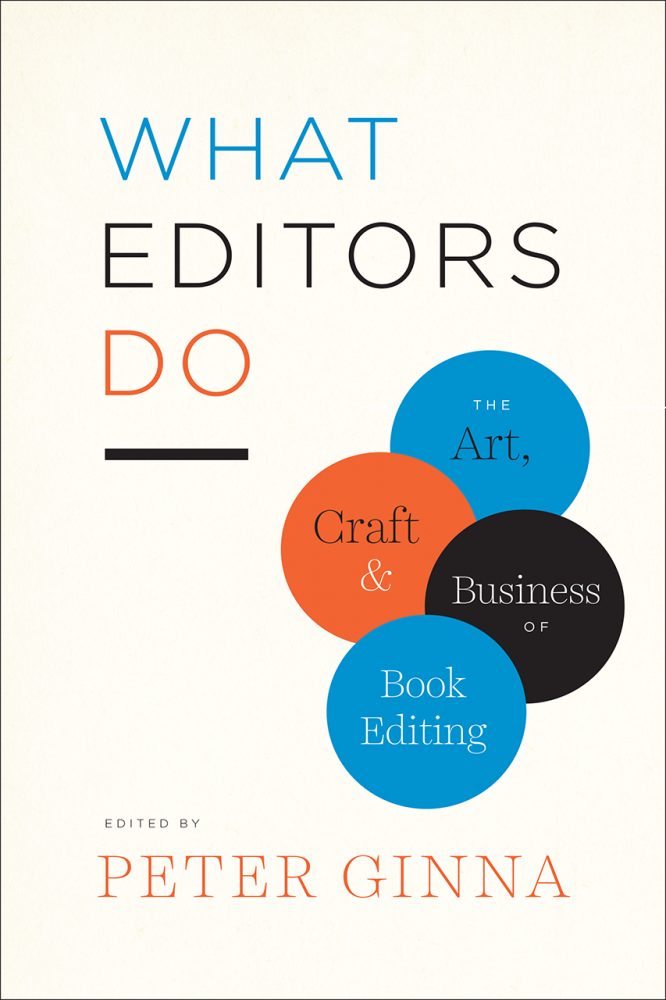 This fall, there’s a new essay collection out, What Editors Do, edited by Peter Ginna and published by University of Chicago Press. I’m delighted to be a contributor; I offer up the last chapter in the book on the editor’s role in a changing industry.
This fall, there’s a new essay collection out, What Editors Do, edited by Peter Ginna and published by University of Chicago Press. I’m delighted to be a contributor; I offer up the last chapter in the book on the editor’s role in a changing industry.
As Peter says in the introduction, “It’s ironic that publishing, a business whose essence is words, has some of the loosest, most confusing, and most contradictory terminology of any industry I know. … [T]he title of editor misleading. What the word editing connotes to most people—correcting and improving an author’s text—is only part of what book editors do.”
Thus What Editors Do covers three phrases of editing: acquisition (finding the book), the editing process, and publication (bringing the book to the reader). Twenty-seven people in book publishing—representing publishers large and small, and encompassing trade, textbook, academic, and children’s publishing—discuss the function of editors and reflect just how much it matters to writers and readers everywhere.
As such, the book is a resource both for those entering the profession (or already in it) and for those outside publishing who seek an understanding of it. It sheds light on how editors acquire books, what constitutes a strong author-editor relationship, and the editor’s role at each stage of the publishing proces (a role that extends far beyond marking up the author’s text). This collection treats editing as both art and craft, and also as a career.
Here’s a brief look at my chapter:
In a talk at Frankfurt Book Fair’s CONTEC 2013 conference, called “The Future of Metadata,” German publishing expert Ronald Schild emphasized the need for semantic analysis, which relates to identifying the “core concept” of a book. Without semantic analysis, recommendations are less valuable; for example, your average reader is not searching for books by ISBNs or trim size but by themes, such as LGBT coming-of-age stories, thrillers set during the Communist era, or other intellectual or emotional touchstones. But up until the growth of online retail, publishers had done very little thinking about this type of marketing.
One of the most fascinating aspects of the discussion is how much metadata can affect the sales of fiction. Conventional wisdom might lead one to believe it’s most important for information-driven books, but a Nielsen study indicates just the opposite. When publishers provide specific, detailed information about their novels instead of broad generic labels (which don’t help readers), sales jump. For example, more readers are attracted to a title tagged with “historical suspense,” “19th century,” “London,” and “female protagonist” than to one simply labeled “mystery.” The same discussions have also been happening in the self-publishing community, where authors have discovered that being meticulous with their categories, keywords, and summary descriptions have resulted in better visibility and thus better sales.
What do these trends mean for editors? To be the best possible advocates for their books, editors need to think about this larger picture throughout the book’s development, starting in the acquisition stage. No one can count on quality bubbling to the top by itself—not that it ever did…
For more about the book, check out this interview with the editor of the collection, Peter Ginna, or take a look at the table of contents at Amazon.

Jane Friedman has spent nearly 25 years working in the book publishing industry, with a focus on author education and trend reporting. She is the editor of The Hot Sheet, the essential publishing industry newsletter for authors, and was named Publishing Commentator of the Year by Digital Book World in 2023. Her latest book is The Business of Being a Writer (University of Chicago Press), which received a starred review from Library Journal. In addition to serving on grant panels for the National Endowment for the Arts and the Creative Work Fund, she works with organizations such as The Authors Guild to bring transparency to the business of publishing.

Wow. That’s fascinating and quite a surprise. The finding makes sense as I think about it–our brains love detail–it’s what makes anything come alive for us.